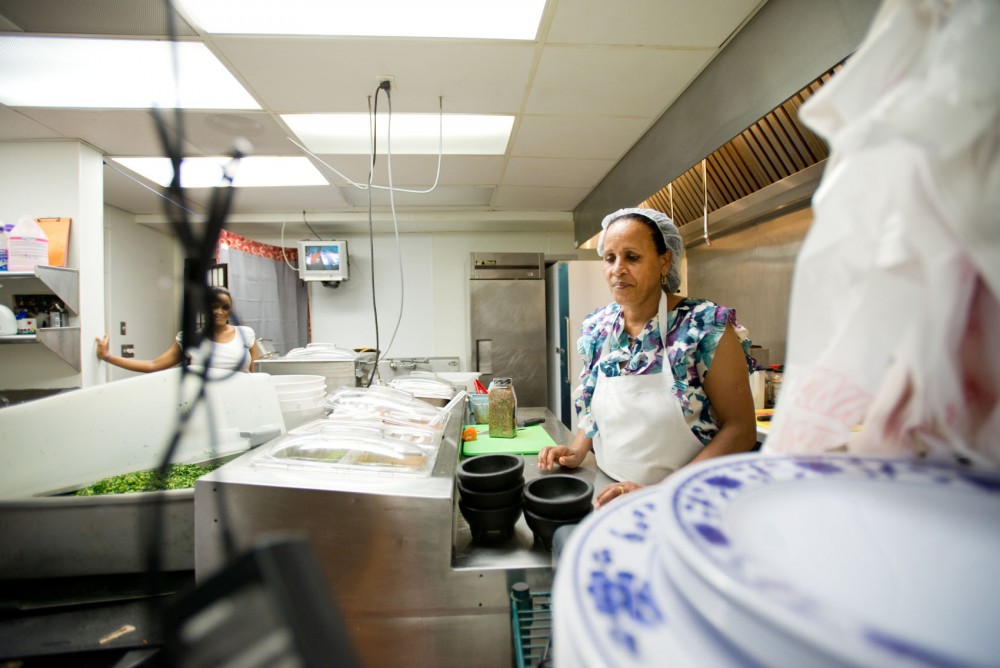A new Ethiopian restaurant recently opened near the University of Minnesota’s West Bank.
Dilla’s Ethiopian Restaurant opened June 18 in the former Baldy’s BBQ building between Hard Times Cafe and Associated Bank on Riverside Avenue.
The owner, Beko Tufa, said she has spent the last nine years saving money in hopes of opening a business, and she was able to do so with the help of family and friends.
Tufa, 62, said she came to the U.S. with intentions to start a family business, which would enable her to help the rest of her family immigrate and work with her.
Entrepreneurship is important for first-generation immigrants who may lack the education or language skills to break in to the larger economy, said Matthew Holm, communications and fund development manager at the African Development Center.
When people of the same culture or language form a community, it creates a demand for certain businesses, he said.
“It’s not as scary to sell or to start a business when there’s a community already there,” Holm said.
Tufa said when she sought help from the African Development Center, they recommended that she take their business and finance classes.
She didn’t want to postpone the opening any longer, though, and felt cooking at the Red Sea Bar and Restaurant for six years gave her enough experience to make the restaurant successful.
So far business has been good, but Tufa is in the process of obtaining a liquor license from the city to attract new customers.
Russom Solomon, owner of the Red Sea, said he is supportive of Tufa’s new business and doesn’t view it as competition.
“Having a restaurant in that area is a good addition to us,” he said.
Jamie Schumacher, the executive director of the West Bank Business Association, said the organization’s members unanimously voted to write a letter of support for Dilla’s opening, which Schumacher said they do for businesses they think will be an asset to the community.
“Having a family-owned business where there used to be a vacant space is a positive thing,” she said.
Beko Tufa’s Journey
Tufa’s cooking became popular with her friends and family when she was a housewife in Awassa, Ethiopia.
Her daughter, Ayantu Tefera, said life in Ethiopia was hard. Tufa’s husband died when Tefera was young, and Tufa’s cousins helped raise her eight children. Eventually, she had to move to Kenya to obtain basic needs for her family.
Tufa and her second husband were only able to bring two of their children to Kenya in 1997. Today, the siblings remain separated, with three living in Minnesota, two in Kenya and three in Ethiopia.
Tufa started her official cooking career as head chef of a restaurant in Nairobi, Kenya. She worked there until she received the opportunity to immigrate to the U.S. in June 2003.
Shortly after arriving, she was employed by Radisson Plaza Hotel in downtown Minneapolis as a housekeeper. Two years later, she picked up a second job at the Red Sea, where her cooking again gained popularity.
Tefera said many Red Sea customers came in specifically for Tufa’s cooking.
“They were always asking if my mom is there in the kitchen, or if somebody else is cooking,” she said.
Five years later, Tufa slipped on some ice in the Red Sea parking lot, resulting in a broken ankle. After surgery to have six pins put in her ankle, Tufa’s doctor told her she would have to cut back her hours, so she quit her housekeeping job in 2011.
“Even though she was feeling pain after she had surgery, she continued cooking,” Tefera said.
With the help of her mother, Tefera came to the U.S. shortly after the accident to help plan and open Dilla’s.
Tufa worked at the Red Sea until about a week before opening her restaurant. Tefera said many of the customers from the Red Sea came to her grand opening to show support.
Tefera is the co-owner and helps out at the restaurant when available, but she is currently studying to obtain her GED diploma at Lincoln International High School in Minneapolis.
Tefera said she wants to share her mom’s cooking with the community, especially with people who have never tried Ethiopian food.
“We’re happy to welcome them,” she said. “We’re here to help them out and to make them feel good.”








